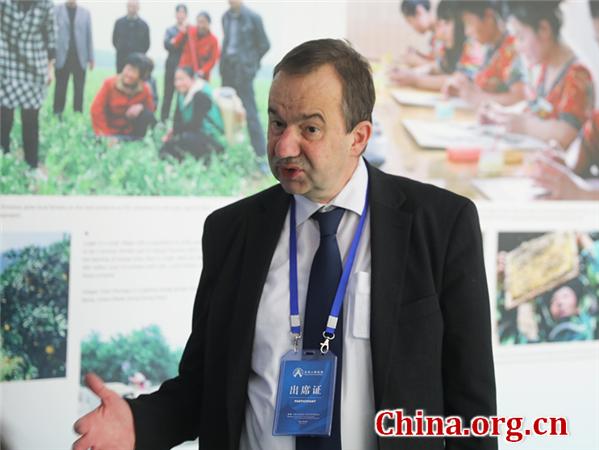China's poverty alleviation wins impressive achievements: Dutch scholar
Chinagate.cn,September 20, 2018 Adjust font size:
Promoting and putting people first at the international level is a good way to let China's stories and voices be heard by the world, said a Dutch scholar at the Beijing Forum on Human Rights on Tuesday.

Tom Zwart, professor of Law, Utrecht University, and director of the Cross-Cultural Human Rights Center, Vrije Universiteit Amsterdam, the Netherlands, pointed out that during each of the past five years, China has lifted 14 million people out of poverty, which constitutes the most important human rights contribution of all time. These impressive numbers are the result of the targeted poverty alleviation policy introduced in 2014.
"Targeted poverty alleviation is a bottom-up approach which seeks to increase the skills of the impoverished population and to improve their capacity for self-development," Zwart said.
He explained that the concept of "putting people first" as applied to poverty alleviation emphasizes the role people can and should play by themselves to promote and protect human rights. It underscores the importance of the contribution made by businesses and other social actors, and stresses the need to focus on local conditions.
"For these reasons the concept is closely connected to the object and purpose of the Universal Declaration of Human Rights, so it has found strong support in the UDHR. Relying on the concept is one of China's original and important contributions to the field of human rights which deserves a wide international audience." Zwart stressed.
He also indicated that so far the international human rights discourse is being dominated by Northern ideas and approaches. The time has come for China and other Southern countries to be given attention for their contributions. Only in this way will the outside world be able to understand the stories and voices of China.
When talking about the recent U.S. withdrawal from the Human Rights Council, Zwart said that it may create a new dynamic, which will offer opportunities for building and extending coalitions. Because the EU used to cooperate closely with the U.S. within the Human Rights Council and in the field of human rights, it now has lost an important partner and is probably looking for alternative forms of cooperation. So, it could be a good time for China to work with the EU on human rights, and it will offer China new strategic opportunities at the international level.
However, challenges still exist, Zwart mentioned. China and Europe have very different views on human rights. In European culture the individual takes center stage, and individual civil and political rights are more important than social, collective and economic rights. But in China, the individual is considered to be part of a collective, and individual interest is considered to be inseparable from those of the group. Therefore to protect individual rights is to promote collective rights.
Another challenge is the EU expectation that China, as an emerging power, should socialize into the existing international order, which in fact means replacing Chinese norms by European standards. However, China is unlikely to follow that road, and instead, it promotes the concept of "building a community of a shared future for humanity."
Facing the challenges, Zwart suggested China and EU find common ground by taking two steps. First, the two sides should opt for reciprocal rather than unilateral socialisation. This means not only socialisation of the emerging power into the existing order, but also the opportunity for the rising power to reshape the current international order.
Second, an informal expert group could be set up, consisting of academics in the field of human rights from China and Europe. It would be tasked with identifying human rights issues which are of interest to both sides, and reworking them into a joint agenda for cooperation within the Human Rights Council.
By following these two steps, "China and the EU would be able to forge a partnership in the area of human rights, which would allow China to have the stories and voices of China heard within the international human rights community," Zwart stressed.